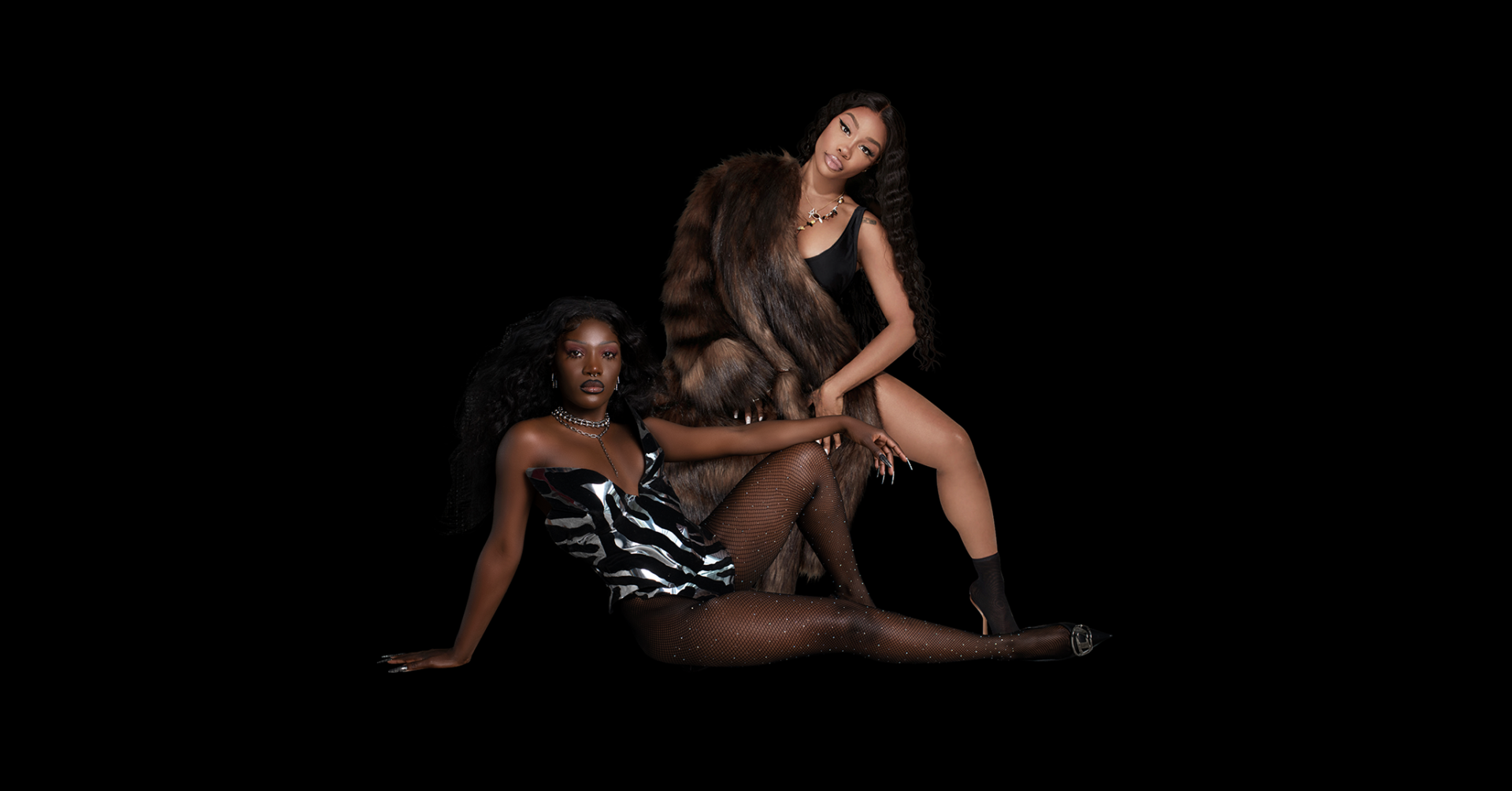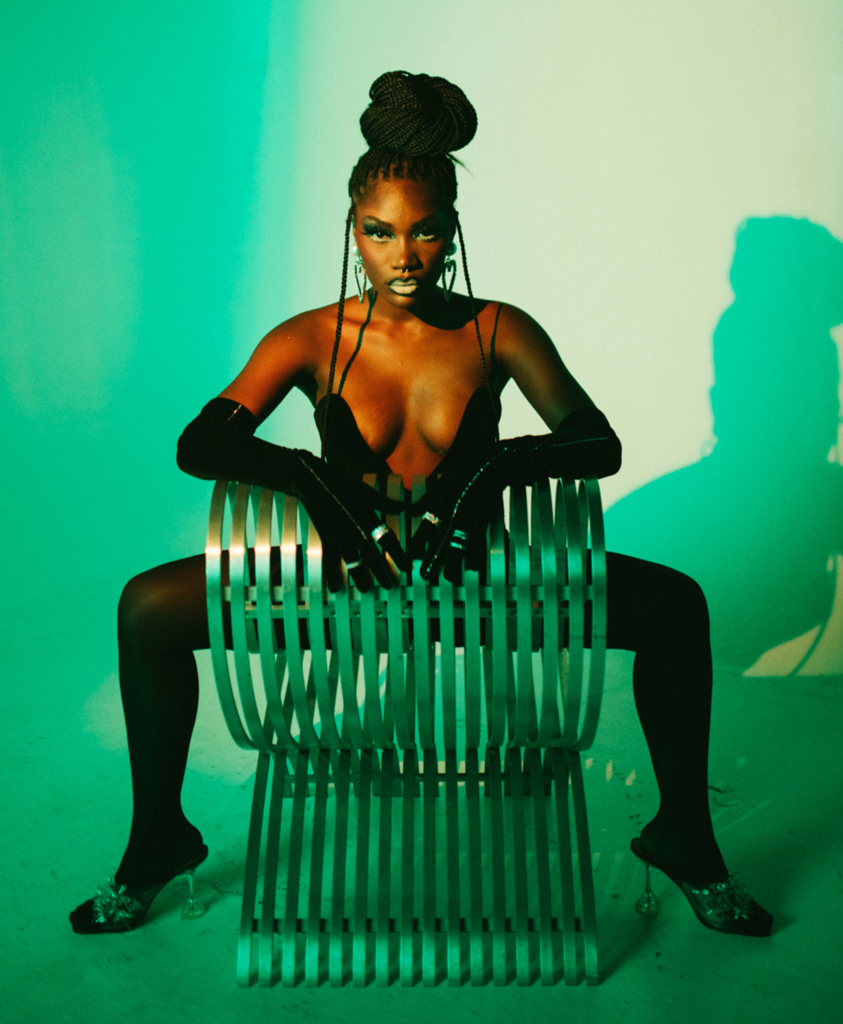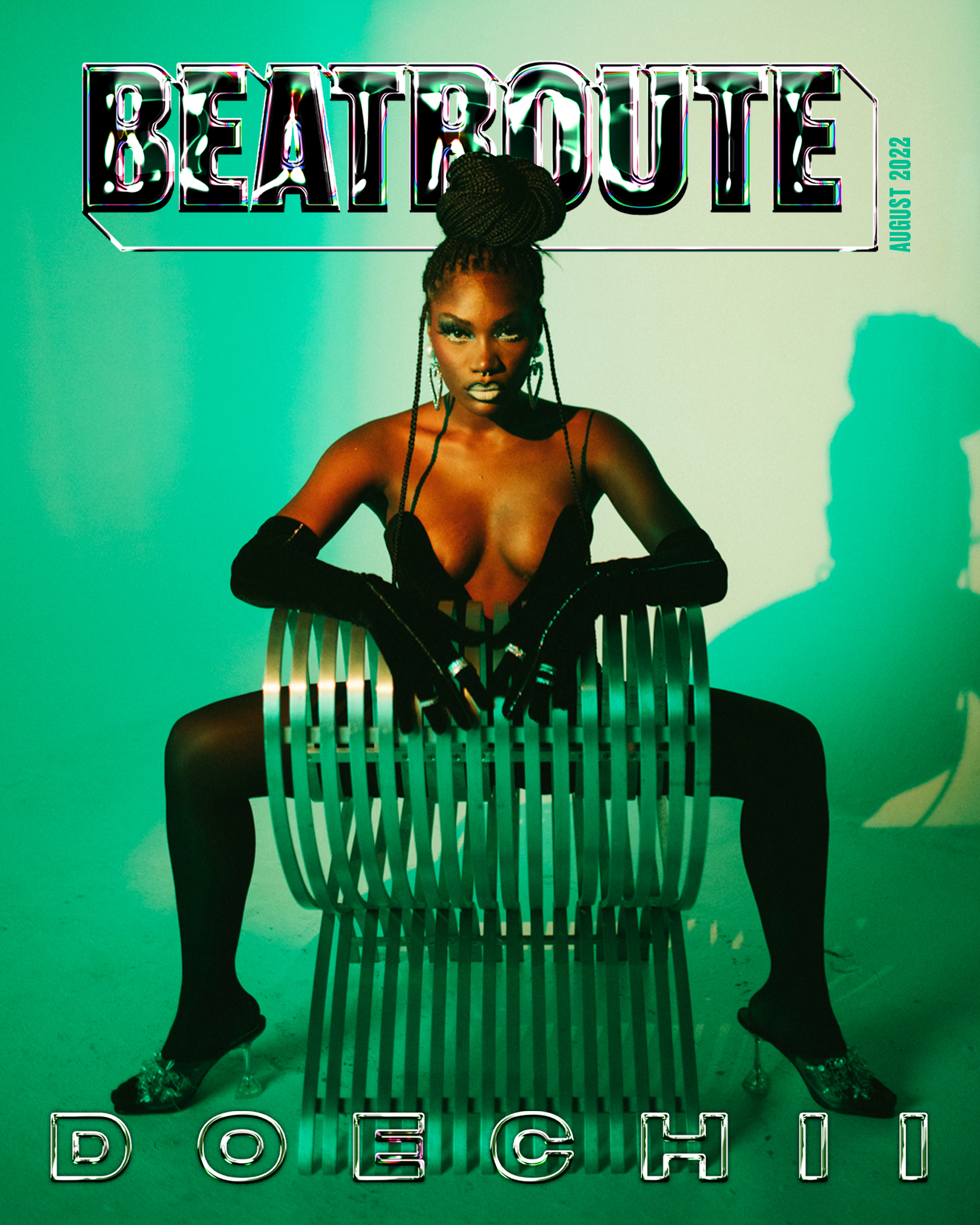COVER
Doechii's
Class Is in Session
By Gabby Sgherri
Publishing date: Aug 08, 2022
W
When people look at the title, most people get uncomfortable with it and I kind of like that because I really want people to think about why they get uncomfortable with the title ‘black bitch’ and how much negativity and oppression is attached with that slur,” Doechii says over Zoom, explaining the concept for her new EP she / her / black bitch released on August 5th. In true Doechii fashion, there is a deeper meaning behind the pronoun title, and an origin story that dates back to the early days of her career when she wasn’t performing on The Tonight Show with Jimmy Fallon or on the main stage at the BET Awards (both of which happened this year). “A while ago when I was in New York, me and two of my friends, one of my friends is non-binary, their name is Miku, and then my other friend her name is Yen. We came up with this production company name, Those Black Bitches, where we basically wanted to make a bunch of content together, music videos, and projects. Once we came up with that name it became an identity and I started joking around saying that my pronoun was she/her/black bitch and it ended up sticking,” Doechii recounts referring to the pronouns on display in her Instagram bio. “With this project, I wanted to basically highlight and celebrate the different layers of the black bitch and open up a conversation about what that means.”
The uneasiness that the title evokes is the epitome of thought-provoking music prompting the listener to question their reaction and the deeper meaning behind it. “I really wanted to change it from a slur to something empowering because I recognize all the moments in my life where people called me a black bitch were moments when I actually felt most powerful. [When] I was in a position of power or leadership and they felt I wasn’t qualified to be there or when I would assert myself I would be a black bitch.” By doing so, Doechii is flipping the script and reclaiming a belittling derogatory term by recognizing that others only try to make you feel little or unimportant when the reality is quite the opposite. “I realized that I only felt negative about that slur when it would come from other people but ultimately the state of mind and position of power that comes with the moment where I’m being called a black bitch is everything to me. So I started taking it on, like yea I am a black bitch, it’s an archetype to me—not a slur anymore. It’s a certain type of black girl and that’s who I made this project for—that black girl,” Doechii confidently concludes.
Executing purposeful concepts is nothing new for Doechii, remember her 2020 Dr. Seuss-inspired title EP Oh The Places You’ll Go? Released when she was still an independent artist, the album is set in a classroom complete with theatrical skits that take you through different points in her life while flexing her genre-bending versatility. The vulnerable and introspective offering was a way for Doechii to heal inner childhood wounds through her chosen medium of art, and it’s those exact qualities that make it so relatable because let’s be real—no one bonds over perfection. The viral “Yucky Blucky Fruitcake” succinctly captures the trials she faced during her early years, from being an outlier amongst her peers and getting bullied to sexuality and survival in tough environments. The lyrical wordplay, “Doechii is a dick, I never fit in / Overly cocky, I’m hyper-ambitious”, paired with her agility to switch flows like she’s snapping her fingers garnered praise from industry critics and fans alike.
When people look at the title, most people get uncomfortable with it and I kind of like that because I really want people to think about why they get uncomfortable with the title ‘black bitch’ and how much negativity and oppression is attached with that slur,” Doechii says over Zoom, explaining the concept for her new EP she / her / black bitch released on August 5th. In true Doechii fashion, there is a deeper meaning behind the pronoun title, and an origin story that dates back to the early days of her career when she wasn’t performing on The Tonight Show with Jimmy Fallon or on the main stage at the BET Awards (both of which happened this year). “A while ago when I was in New York, me and two of my friends, one of my friends is non-binary, their name is Miku, and then my other friend her name is Yen. We came up with this production company name, Those Black Bitches, where we basically wanted to make a bunch of content together, music videos, and projects. Once we came up with that name it became an identity and I started joking around saying that my pronoun was she/her/black bitch and it ended up sticking,” Doechii recounts referring to the pronouns on display in her Instagram bio. “With this project, I wanted to basically highlight and celebrate the different layers of the black bitch and open up a conversation about what that means.”
The uneasiness that the title evokes is the epitome of thought-provoking music prompting the listener to question their reaction and the deeper meaning behind it. “I really wanted to change it from a slur to something empowering because I recognize all the moments in my life where people called me a black bitch were moments when I actually felt most powerful. [When] I was in a position of power or leadership and they felt I wasn’t qualified to be there or when I would assert myself I would be a black bitch.” By doing so, Doechii is flipping the script and reclaiming a belittling derogatory term by recognizing that others only try to make you feel little or unimportant when the reality is quite the opposite. “I realized that I only felt negative about that slur when it would come from other people but ultimately the state of mind and position of power that comes with the moment where I’m being called a black bitch is everything to me. So I started taking it on, like yea I am a black bitch, it’s an archetype to me—not a slur anymore. It’s a certain type of black girl and that’s who I made this project for—that black girl,” Doechii confidently concludes.
Executing purposeful concepts is nothing new for Doechii, remember her 2020 Dr. Seuss-inspired title EP Oh The Places You’ll Go? Released when she was still an independent artist, the album is set in a classroom complete with theatrical skits that take you through different points in her life while flexing her genre-bending versatility. The vulnerable and introspective offering was a way for Doechii to heal inner childhood wounds through her chosen medium of art, and it’s those exact qualities that make it so relatable because let’s be real—no one bonds over perfection. The viral “Yucky Blucky Fruitcake” succinctly captures the trials she faced during her early years, from being an outlier amongst her peers and getting bullied to sexuality and survival in tough environments. The lyrical wordplay, “Doechii is a dick, I never fit in / Overly cocky, I’m hyper-ambitious”, paired with her agility to switch flows like she’s snapping her fingers garnered praise from industry critics and fans alike.
I really wanted to change it from a slur to something empowering because I recognize all the moments in my life where people called me a black bitch were moments when I actually felt most powerful.
I really wanted to change it from a slur to something empowering because I recognize all the moments in my life where people called me a black bitch were moments when I actually felt most powerful.
It was a matter of time before label executives came knocking and in the game of courtship, there was only one suitor Doechii was willing to give up her independence for. Skipping the soft launch and going straight to the label reveal, it was announced in March earlier this year that Doechii had found her match with the influential Top Dawg Entertainment. In doing so, she took TDE’s female rapper V-Card by becoming the first on the label. Shortly after she performed at Coachella during labelmate Isaiah Rashad’s set for their collaborative song “Wat U Sed” and has continued on an upward trajectory since.
Doechii had unknowingly laid the groundwork for her first EP under TDE, she / her / black bitch, before she got signed. “I moved to New York without any money [or] job and my plan was to get out there and it’s going to force me to work really hard. Then I’m going to get a job and something’s going to happen miraculously—it didn’t work out that way,” Doechii shares of her decision to leave her home in Tampa, Florida. “For a while, I viewed it as a mistake, I slept in a McDonald’s [because] I didn’t have anywhere to stay, it was really cold [and] fucking horrible. That ended up leading me to The Voice and through [that] audition I met another connection and got a show. Then from the show, I met this girl and she became my roommate and that’s the same girl I’m talking about [who I] made the production company, Those Black Bitches, [with] which led me to she / her / black bitch right now. So, that’s how things connect for me in my life.” Right before sharing that story, I referenced a statement Doechii had previously made in an interview about following her heart matched with logic—every strategic decision she makes is about authenticity and alignment. When your compass is focused on the internal rather than the external, moves initially perceived as mistakes are part of a larger plan leading you exactly where you’re meant to be.
The EP is not the only thing coming to fruition, Doechii’s dance hit “Persuasive” was originally released in March and quickly became a fan favorite with its alluring melody and smooth vocals. The song couldn’t get any better until Doechii announced she had a fellow female TDE artist jumping on the remix. “I literally have it in my journal, in my Google documents, [that] I manifested a SZA collab. I said one day I’m going to work with SZA, she’s going to want to work with me, we’re going to make a hit song and it’s going to be #1. I manifested that in 2020, I went back to that same doc [recently] and saw that. So, that’s an example of my heart matched with logic [because] when I got on TDE I completely forgot that I even set that goal. I wasn’t like oh I’m going to get on TDE so I can get a SZA collab like no [laughs] but full circle it happened and I’m still waiting for that manifestation to come—it’s gonna be #1.”

There’s not a lot of black villains that are successful in this industry but there are a lot of people who have villain archetypes, other races, and tend to get praised, are famous for being a villain, or get more jobs because of that.
The guiding light of heart plus logic keeps the focus on substance and astray from the bombast. In the case of she / her / black bitch, the concept already set a meaningful outline, it was just about finding the right pieces that fit. “I made the song [Swamp Bitches] and the whole concept is the black bitch who is the villain. A lot of times, I’ve seen black women in the industry get villainized, and more times than not they end up losing opportunity, money, and work—it actually affects their life. There’s not a lot of black villains that are successful in this industry but there are a lot of people who have villain archetypes, other races, and tend to get praised, are famous for being a villain, or get more jobs because of that.” Having heard the song prior to our conversation, everything clicks when I hear the context of why. She brings up an important point in unpacking that black bitch and exactly what it means. I can’t speak on the issues she spotlights from personal experience (my heritage is mixed and white-passing) but that’s the point, isn’t it? Thought-provoking art is meant to challenge you by thinking about what’s being said, appreciating the creativity in how it’s being said, and recognizing the bias that may be obstructing your awareness. It’s also a touchpoint for connection amongst minorities because music evokes a feeling and your story doesn’t have to be identical to the lyrics to tap in.
“I wanted to make a song that really celebrated that type of black girl and I wanted the song to feel like the villain won. You know how every time you see a superhero story the superheroes always win? It’s so annoying, I’m pretty dark in that way, I want to see the villain win—so that’s how that song came about.” The track starts off with ominous production that feels like the perfect theme song for a villain arc before the vocals come in and Doechii is assisted by another special guest. “I was like who would I characterize as a villain? Who would look cool visually as a villain? and I was like Rico fucking Nasty [laughs] she just sounds like [maniacal laughter]. I put her on the track and she floated like a butterfly and it’s so cool.”
The boxing of creatives into “genres” is getting old and it’s artists like Doechii that prove how antiquated the concept of categories in music is. She can spit bars on “Swap Bitches” with Rico Nasty leveraging a fast-paced flow over thumping production and in the same breath let her airy vocals sonically float on “Persuasive” with SZA. There’s no road map or master plan for how she’s going to utilize the tools in her toolbox, it’s intrinsic to her identity, proven by her approach to creation. “I kind of feel the music, I’m not thinking about I want to sound this way, I just let it flow and organically create.” She elaborates saying, “I like to take on different characters [and] do whatever the song calls for. [An] example [is] my single “Crazy” all the yelling and stuff, I feel like that was just a spiritual experience, something took over me and I naturally did that.” She does have a guiding objective, “I’m tapping into an energy so when I create I want to focus on the feelings that I want to give the audience. I’m not focused on how it happens—I just want to get across the feelings.”

Doechii’s affinity for theatrics and storytelling makes sense given her background in performing arts—ballet, tap dancing, acting, and classic chorus singing to name a few. Making her own music allowed her to encompass a bit of everything and she can remember why she made the switch. “I actually loved being in a chorus and singing other people’s songs but I remember running into a lot of conflict with my instructor because I would want to sing things my way, change the arrangement, and getting in trouble [for it]. He wouldn’t let me express myself creatively in my own way so I was like okay I’m gonna leave and do my own thing.” She did just that, taking cues from her friend Taylor Moon who showed her the possibilities of being an independent artist. “When me and Taylor made our first song together it was called “El Chapo” [and] it went crazy…well at that time we thought it was going crazy [laughs]. My whole city started booking us to perform and we were like oh shit not only do we think it’s dope but the whole city fuck with it.” Those early moments in Doechii’s career mimic some of the recent milestones when following her heart matched with logic paid off in a big way but the essence is the same.
The confidence to unapologetically be yourself, without doubts of failure or judgment, is set by example. “The way [Dr. Seuss] imagined really inspired me to expand my mind to imagine the same way. When I talk about these people or influences, I’m not talking sonically, I’m talking about the fearlessness of Tyler, the Creator—that’s what influenced me. Junie B. Jones, her fearlessness and sass, I picked that up and not just like her but in my own way. They made me feel less afraid to be me when I could see somebody else being them so boldly,” Doechii says of the characters that taught her the value of being yourself. There’s no doubt that Doechii does for her growing legion of fans (sometimes called “the coven”) what Dr. Seuss and Junie B. Jones did for her. Whether it’s her genre-bending sound, fearlessness, symbolic visuals, intricate concepts, or her personal experiences spun into lyrics—there’s a multitude of learning opportunities for the listener. You don’t need the classroom setting of Oh The Places You’ll Go to take a seat and let your personal experiences filter through the many lessons Doechii is serving to find the ones that speak to you.

